#Emilio Salgari
Text
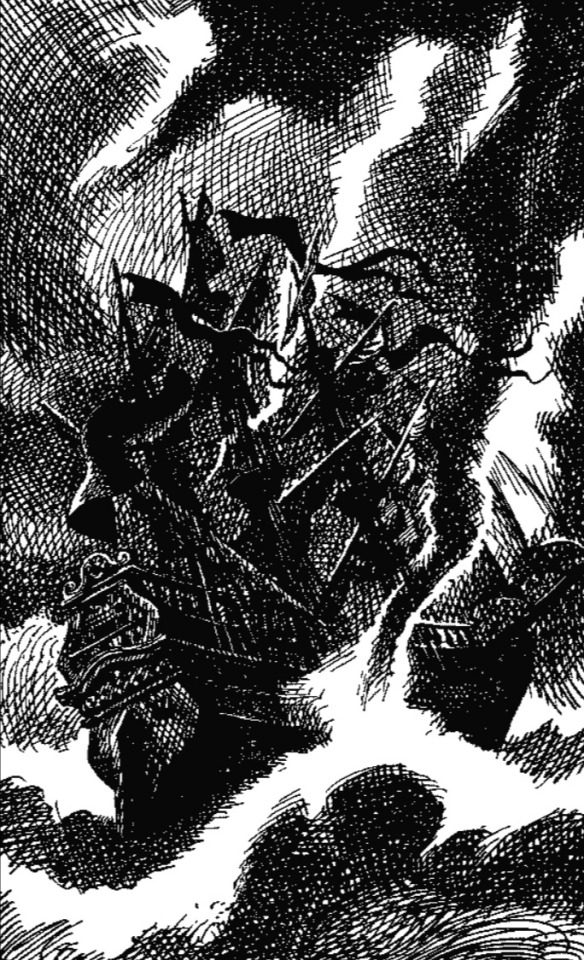
Illustration of 'Black Corsair' by Emilio Carlo Giuseppe Salgari, (1862 - 1911)
230 notes
·
View notes
Text
Round 1 Part 8 Poll 5


Propaganda
She becomes captain of the Empress
He's the captain of the Pearl of Labuan
#battle of the captains#tournament polls#round 1#elizabeth swann#potc fandom#potc#the pirates of the caribbean#pirates of the caribbean#sandokan#emilio salgari#the pirates of malaysia#pirates of malaysia#movieblr#bookblr#swashbuckler
45 notes
·
View notes
Text
" È consolante riandare alle proprie letture. Penso alle fughe nel fantastico quando si leggeva dei pirati della Malesia di Emilio Salgari, o Giulio Verne e i viaggi per ventimila leghe sotto i mari, o le memorabili avventure di Oliver Twist in Dickens, o l’Odissea che lessi da piccolo in una edizione illustrata a colori, e i favolosi volumi della «Scala d’oro» che la Utet stampava, divorati nel tepore della cucina. Daniel Pennac ricordava la sua lettura di Guerra e pace «che si svolse di notte, alla luce di una lampada tascabile, e sotto le coperte tirate su come una tenda in mezzo a un dormitorio di cinquanta sognatori, russatori e sussultatori»*. Walter Benjamin, in Infanzia berlinese, ricorda i romanzi di avventura della sua infanzia che gli venivano incontro come venti del Sud o tempeste di neve: «I paesi lontani che vi incontravo danzavano confidenzialmente l’uno intorno all’altro come fiocchi di neve. E poiché ciò che scorgiamo lontano attraverso la neve non ci invita fuori, ma dentro, cosí Babilonia, e Bagdad, Akka e l’Alaska, Tromsö e il Transvaal abitavano dentro di me»**.
Tutto ciò che l’umanità ha pensato, concretizzato, fantasticato, sentito e intuito sta nei libri. La finzione della poesia o della narrativa ci fa percepire il mondo presente e ricostruire il passato. È simulazione potente di vita vera e di emozioni. Grande consolazione è il sapere che tutto sta nei libri, nella loro presenza fisica. "
* D. PENNAC, Come un romanzo [1992], Feltrinelli, Milano 2000, p . 122.
** W. BENJAMIN, Infanzia berlinese [1950], Einaudi, Torino 1973, p. 78.
---------
Gian Luigi Beccaria, In contrattempo. Un elogio della lentezza, Einaudi (collana Vele), 2022. [Libro elettronico]
#letture#leggere#citazioni#saggistica#scritti saggistici#libri#Gian Luigi Beccaria#In contrattempo#Emilio Salgari#Odissea#I pirati della Malesia#Giulio Verne#Jules Verne#Ventimila leghe sotto i mari#Oliver Twist#charles dickens#Scala d’oro#Utet#Daniel Pennac#Guerra e pace#lev tolstoj#leo tolstoy#Walter Benjamin#Infanzia berlinese#romanzi di avventura#ricordi d'infanzia#poesia#narrativa#emozioni#vita
22 notes
·
View notes
Text
Happy Birthday to Emilio Salgari (August 21, 1862 – April 25, 1911).
26 notes
·
View notes
Text
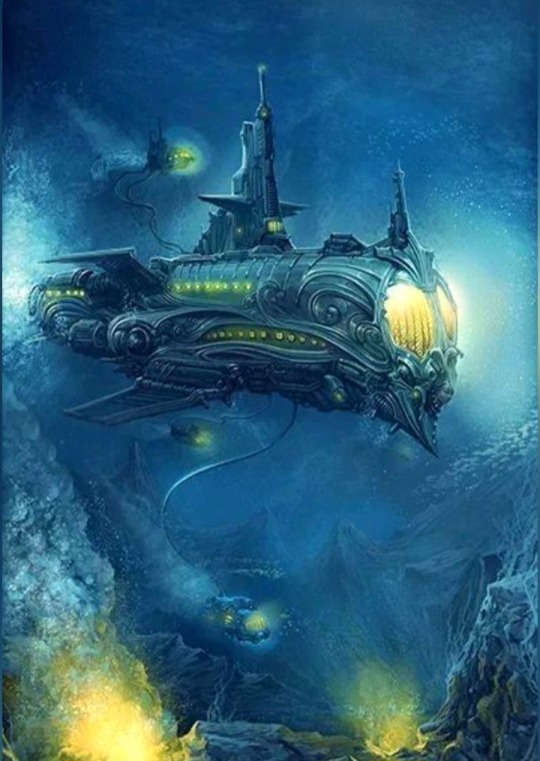
Nautilus !
#angolidiarteefantasia#fantasy#emilio salgari#Salgari#20000 leagues under the sea#20000 leghe sotto i mari#20000leghesottoimari#emiliosalgari#capitan nemo#romanzo#romanzi#libro#leggere libri#leggere#angolidicultura#culturaearte#culturaitaliana#culturaelibri#leggerelibri#nautilus
30 notes
·
View notes
Text
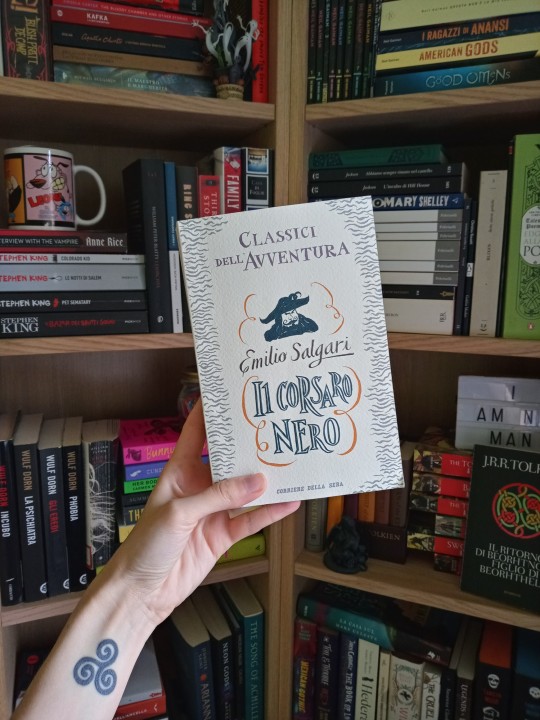
The Black Corsair by Emilio Salgari
This is, believe it or not, the first book I read by Salgari. He is one of the biggest classic adventure authors in Italy, and let me tell you the man was obessesed with pirates. So many of his book series are about pirates, which makes it even more unbeliavable that I never read one of his novels before. The Black Corsair is the first novel in his Corsairs of the Antilles series. The story is centered around the black corsair, of course, who is a feared pirate in the Caribbean. This pirate, the former Lord of Ventimiglia, is seeking revenge for the murder of his brothers. In fact the story's main topic is revenge. The black corsair swears he will avenge his brothers by killing the entire family of the governor of Maracaibo, his nemesis and the man who executed two of his brothers.
For some reason going into this I wasn't expecting the black corsair to be a positive character, I thought he would be a villain of some sort. Instead he is represented as this incredibly skilled and brave pirate, who is also very honorable. This is peak romanticization of the pirate figure, and let me tell you I am here for it. For some reason pirates have always been fascinating to me, and this novel plays a lot into this fascination for this type of characters. It's also set during the golden age of piracy, so you couldn't ask for more. The narration was a bit slow, but I listened to the audiobook which honestly didn't make it too bad, it's actually pretty entertaining. It's a classic that was first published in 1898, so you should keep it in mind obviously. But as I said it's really adventurous and entrtaining, it was the perfect audiobook choice for summer (so much so that I am listening to the sequel at the moment). Salgari was an insanely prolific author and I am very curious to read more of his books. Of course I will have to read at least the first Sandocan book as that is probably his most famous character (of which I remember very little from the animated series I would watch in the morning before school when I was a kid), but I read he wrote some of the first proto sci-fi in Italy and I am very intrigued by it. What makes things even more absurd is that this man didn't travel at all. He wrote adventures set in basically all continents all thanks to his library loans, which really shows you the power of reading, because the settings feel very authentic. Although the book is a bit slow I feel like it's a classic that could work for people who haven't read a lot of classics. It's adventurous nature makes it feel engaging and the writing wasn't too difficult to follow. As I said the audiobook version in my opinion was a winner so I would recommend that option if possible, but overall it was a nice classic to add to my read pile.
I read this book for the black and white cover prompt of the jumbo reading challenge (I know there two colored swirls but this is the closest I can get for this prompt with the books I own atm).
#2023 book#book#books#bookblr#booklr#the black corsair#il corsaro nero#emilio salgari#book cover#book rec#book recommendation#book review#reading#mine#the---hermit
20 notes
·
View notes
Text
Me: you know, it's so weird that Verne was pretty popular in the English speaking world, and yet Emilio Salgari, who was also big in the rest of Europe and Latin America, remained unknown and untranslated until very recently.
Emilio Salgari: so Sandokan is about this Malayan prince turned pirate because the British came, slaughtered his family and put a British man on the throne. The British man is evil and wicked, and while the Malayan prince is fearsome, he's just and even merciful sometimes. The first novel ends with his marrying a British lady, lady Marianna, who chooses to join him in his way of life.
Me: ah, yeah, that was a thing, yeah.
120 notes
·
View notes
Text
Ok so,
to startIt’s from this early summer that I’m thinking of take part to the Tumblr book club initiative and, because I’m italian, partecipate in it with a classic piece from Italian literature (I’m also well navigate in spanish and french lit but I want to play at home).
Because I’m a Master’s degree working students, anything that had nothing to do with with university/work/all the time left for me to go outside and touch some grass has always been postponed, but now I finally managed to pick up this idea and try to make it happen.
So still in June I brainstormed some ideas about lit classics all in public domain and if I not started yet is because I’m pretty indecise; I hypothesize that the newsletter on substrack could start next year and, accounting to the amount of material, I still have to decide if do it daily, weekly, monthly.
Considering that the idea of a Divine Comedy Weekly has already been taken by @lefthandedleague and if you’re interested you can find the link here, the other ideas that come to my mind are:
Pinocchio by Carlo Collodi, yes the original novel, there are actually 36 chapters so I could made it weekly, there’s a movie coming out each year about it and the novel is of course public domain, so still a pretty popular piece. Is children literature but still a smart novel and so easy to read in a newsletter framework. Finally, I have decided for this one, at least only to start and see how it goes. You can find the link here.
Decameron by Giovanni Boccaccio, this was actually my first idea lol but I debunked at first because organize a newsletter of 100 precise novels + interludes isn’t the easiest job and I’ll need help. If done weekly it could take approximately two years no stop to complete, if done daily I don’t know if it could be too much. In any case, Netflix is planning a series about it and it could be still possibile or at least interesting.
Michelangelo poems, ok this idea came to my mind only because I have two different editions of Michelangelo’s poems in ita/eng. It isn’t the greatest poetry imaginable, but both the editions do a great work to match the sonnets with Michelangelo’s artpieces, so I thinked about a substrack newsletter with each mail that have a poem + artpiece from the artist put together. The poems collected are roughly 300 (yeah he was pretty prolific), it could be done daily covering a year or weelky with 5 poems maybe (or less) for each mail.
The Facetious Nights by Giovanni Francesco Straparola or the Pentamerone by Giambattista Basile, for those who don’t know there are considered the first European storybooks to contain fairy-tales, I actually thinked about the collection by Italo Calvino at first, but there aren’t of public domain so idea cancelled. Both the collections contain old stile fairy tales with dark themes and some of them are an early version of worldwide famous tales, like Cinderella, Rapunzel or Puss in Boots. There are various novels so daily or weekly is pretty free the choice.
Some work by Emilio Salgari, to anyone who don’t know him, he is basically the Italian Jules Verne, in Italy some of his stories are national folklore, is pretty know in hispano-speaking countries but in the anglosphere he is basically nobody :( sad to consider that I grew up reading both Verne and Salgari at the same time. Daily or weekly I have to decide which work take for him, some pieces aged badly according to contemporary sensibilities and could be seen slighly problematic, others I think could be understood still today (Sandokan for example).
Other ideas that came to my mind but I’m :/ about it:
Vita by Benvenuto Cellini, he was a renaissance artist who knowed many ppl of that era like Catherine de’ Medici and this is his autopiography, they also made a lot of films about it. Still I don’t know really how much it could be interesting, still isn’t too long done it weekly.
Histoire de ma vie by Giacomo Casanova, same thing as above (+ I’m not the greatest fan of Casanova, I’m almost from the same city which he grew up and in Venice his myth is strong but still I’ve never been interested in his predatory sheningans).
I have some editions of Leopardi’s works at home including the Zibaldone and his letters translated in eng, but is too much for a newsletter so idea:cancelled.
Other epistolaries that comes to mind apart the Leopardi one are the one of Salvator Rosa (another painter from baroque who was actually pretty punk) or the one of Artemisia Gentileschi, it could be interesting but I have still to read it.
If someone from italian tumblr could have other ideas or take part to the project is free to collaborate :)
#book club#tumblr book club#classic lit#classic literature#italian lit#italian literature#Michelangelo#Emilio Salgari#Decameron#Giovanni Boccaccio#italian history#italian tag#pinocchio#carlo collodi#Tale of tales#tumblr italia#tumblr italy#italian tumblr#tumblrit#tumblrita#langblr
45 notes
·
View notes
Text




Los que habéis leído a Salgari seguro que os acordáis de "La perla de Labuan". Pues la isla de Labuan es así de guapa.
Y por supuesto, está en Malasia. Carol Andre era la perla.
8 notes
·
View notes
Text
I want a new animated series based on Emilio Salgari's novels about Sandokan, Yanez and other characters and went it more based on the novels but still making characters younger. I miss that Mondo TV animated series so much.
3 notes
·
View notes
Text
AI-Less Whumptober Day 3: Gunshot Wound
Alright, folks, come get your pirate polycule! (I say, as if this had not been written for me and only me.)
Prompt: Gunshot Wound (alternate)
Fandom: I Corsari delle Antille | The Corsairs of the Antilles (Il Corsaro Nero | The Black Corsair)
Summary: Captain Morgan shot plenty of men in his time sailing with the Brotherhood of the Coast. He also had plenty of people shoot at him. In his old age, in Jamaica, he reminisces about a number of situations where a gunshot led to his life taking a turn for the better, and the one time it did not.
@ailesswhumptober
#lisa writes whump#ailesswhumptober2023#ailesswhumptoberday3#ai-less whumptober 2023#i corsari delle antille#il corsaro nero#the black corsair#the corsairs of the antilles#emilio salgari#polycule#poly#poly relationship#pirates#piracy#golden age of piracy#fic#fanfic#fanfiction#ao3 link#ao3 fanfic#ao3 fic#italian hivemind#non deludetemi compatrioti#morgan ha due mani e il mondo merita la power throuple che emilio ci ha negato
3 notes
·
View notes
Text
La notte era magnifica. L’oceano scintillava, riflettendo i raggi dolcissimi dell’astro notturno; [...]
Emilio Salgari, Il figlio del Corsaro Rosso
5 notes
·
View notes
Photo
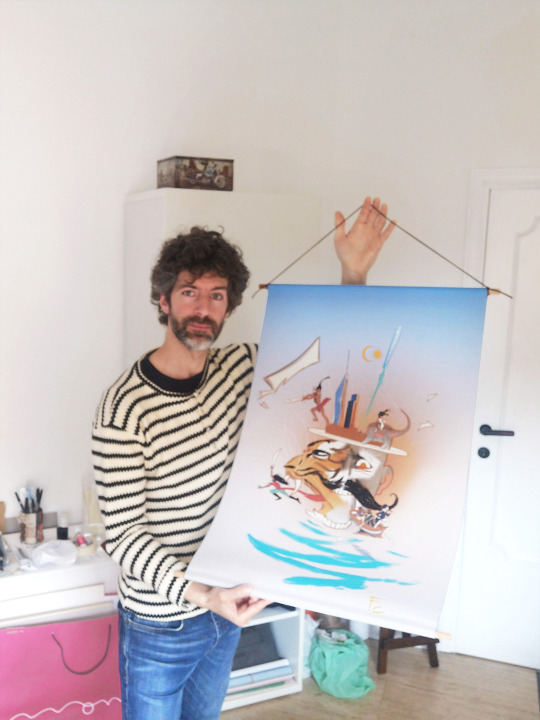
☀️HAI VISTO L'ALBA OGGI?
DID YOU SEE THE SUNRISE TODAY?
日出
Il Sole si è alzato accecante e la Tigre della Malesia è tornata a ruggire!
Lì, a Est!
E In questa stampa su tessuto con una illustrazione dedicata all'avventura e all'immaginazione dello scrittore italiano Emilio Salgàri.
Stampata su cotone Canvas in una tiratura limitata di 20 copie, numerate e firmate.
Una stampa raffinata e affilata come denti a sciabola.
Ma anche un kit "fai da te" da comporre.
SCOPRILA NEL MIO NEGOZIO - - - > “VIAGGI E VILLAGGI”
Eng
The Sun is finally up and the Malaysia Tiger is still roaring!
At East, of course.
But also in this special print dedicated to the adventure and the imagination of the italian writer Emilio Salgàri, author of "the Sandokan adventures"and thousands of others amazing stories.
Printed on Canvas cotton in a limited edition,
numbered and signed.
But also a kit you could compound by yourself.
Discover more HERE
#alba#stampa digitale#emilio salgari#tessuto#cotone#avventura#tigre della malesia#stendardo#oriente#arredo#interni#illustrazione digitale#malesia#asia#viaggievillaggi#faidate#collagedigitale#artwork#sunrise#digitalprint#digitalillustration#canvas#italianwriters#malaysia#tiger#adventure#orient#homedecor#intern#voyages
3 notes
·
View notes
Photo
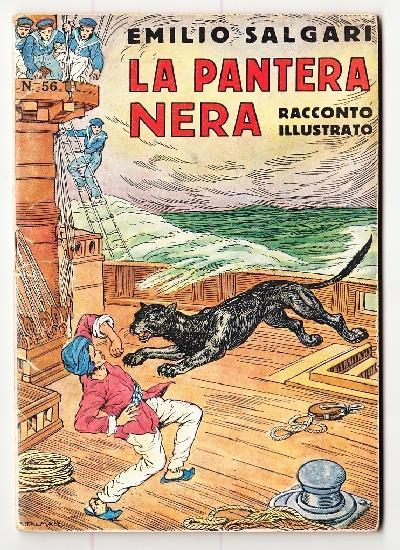
Title: La pantera nera (1936)
Author: Emilio Salgari
Vote: 6/10
Adventure tale in which a panther is released on a ship. Good story but not particularly memorable, average.
3 notes
·
View notes
Text
The Tigers Of Mompracem
Healing And Love
Lady Marianna Guillonk was born under the beautiful Italian sky, on the coasts of the gorgeous Neapolitan Gulf, from an Italian mother and English father. She had found herself an orphan at the age of eleven and heir of a conspicuous fortune, she had been taken in by her uncle James, the only one of her relatives who back then was in Europe.
Back then James Guillonk was one of the most audacious sea wolves of the two worlds, owner of a ship armed and equipped for war, to cooperate with James Brooke, later rajah of Sarawack, for the extermination of the Malaysian pirates, terrible enemies of English commerce in those faraway seas. Despite that lord James, harsh as all sailors, unable to feel whatever affection, didn’t feel any terrible tenderness for his young niece, rather than leave her to stranger hands, had her boarded on his boat taking her to Borneo and exposing her to the grave dangers of those harsh cruises. For three years, the little girl had born witness to those bloody fights, during which thousands of pirates died and which gave to the future rajah Brooke that sad fame that deeply moved and indignated his own compatriots.
But one day lord James, tired of butcheries and dangers, maybe remembering having a niece, had abandoned the sea and had taken residence to Labuan, burying himself under the great woods of the center.
Lady Marianna, then going on fourteen, and who in that dangerous life had acquired an unique energy and fierceness, despite looking like a fragile child, had tried to rebel to his uncle’s wishes, believing herself unable of getting used to that isolation and almost wild lifestyle, but the sea wolf, who seemed not to have much affection for her, had remained unmovable.
Forced to endure that strange prisony, she had dedicated entirely to complete her own education, which up to that point she hadn’t had any time to attend to. Endowed of a tenacious will, little by little she had tamed the fierce fits contracted in those harsh and bloody battles, and that roughness contracted in the continuous vicinity with people of the sea. She had so become a passionate lover of music, flowers, and beautiful arts, thanks to the instructions of an old confidant of her mother, later consumed by the scorching tropical climate. With the progression of her education, even while preserving in the depths of her soul something of her old fierceness, she had become good, generous, charitable.
She hadn’t abandoned her passions for the arms and violent exercises, and often, as an untamed Amazon, she ran for the woods, following even tigers, or like a Naiad she bravely dived into the blue waves of the Malaysian sea; but more often she found herself where misery or misfortune hit, bringing aid to all the natives around, those natives who lord James hated with a passion, as descendants of ancient pirates.
And so that maiden, with her bravery and goodness and beauty, had deserved the nickname of ‘Pearl of Labuan’, nickname who had run so far away and had made the heart of the formidable Tiger of Malaysia beat faster. But under those woods, almost far away from every civil creature, the child, turned girl, had never noticed she was a woman; but when she had seen that proud pirate, without knowing why, she had felt a strange perturbation. What was it? She ignored it, but he was always in front of her eyes, and in her dreams at night, that man of such proud figure, with the nobility of a sultan and the gallantry of an European knight, that man with shining eyes, long black hair and visage on which it could be clearly read a more than indomitable courage and a more than unique energy. After she had charmed him with her eyes, with her voice, with her beauty, she in turn had been charmed and won.
She had at first tried to fight against that heartbeat, new to her, as new it was for Sandokan, but in vain. She always felt that an irresistible force pushed her to see that man again and she couldn’t find peace but with him; she only felt happy at his bedside and when she calmed his acute pains with her chats, her smiles, her uncomparable voice and her mandola. And he was a sight to behold in those moments, Sandokan, when she sang the sweet songs of her faraway mother country, accompanying them with the delicate sound of the melodious instrument.
Then he was no more the Tiger of Malaysia, no more the bloodthirsty pirate. Mute, wanting, covered in sweat, holding his breath, to not disturb that musical and argentine voice, he listened like a man who dreams, as if he wished to impress in his mind that foreign tongue that inebriated him, that suffocated the pangs of his wounds, and when the voice, after vibrating on the last note, died on the last note of the mandola, you could see him remain for a long time in that position, his arms extended as if he wanted to pull the maiden to himself, his blazing gaze fixed in that liquid of hers, his heart lifted and ears pricked as if he was still listening.
In those moments he no longer remembered being the Tiger, he forgot his Mompracem, his prahos, his tiger cubs and the Portuguese, who perhaps at that time, believing him forever extinguished, avenged his death with who knows what bloody vengeances.
Thus the days flew away quickly and his healing, powerfully aided by the passion that devoured his blood, proceeded fast.
In the afternoon of the fifteenth day the lord, suddenly gone in, found the pirate on his feet, ready to leave.
“Oh! My worthy friend!” he cheerfully exclaimed. “I’m so happy of seeing you on your feet!”
“It was no longer possible to remain in bed, milord” answered Sandokan. “After all, I feel strong enough to fight a tiger”
“Excellent, so I’ll soon put you at task!”
“In which way?”
“I have invited some good friends to hunt a tiger that often comes to prowl about my park’s wall. As I see you healed, this evening I’ll go to tell them that tomorrow morning we’ll hunt the beast”
“I’ll be of the party, milord”
“I believe so, but tell me now, I hope you’ll remain as my guest for some time”
“Milord, serious matters call me elsewhere and I need to leave you soon”
“Leave me! Don’t think about it, there is always time for matters and I warn you that I won’t let you leave sooner than a few months; now, promise me you’ll stay”
Sandokan stared at him with flashing eyes. For him, staying in that villa, next to the maiden that had charmed him, was everything. He didn’t ask for more for the moment.
What did he care that the pirates of Mompracem mourned him for dead, when he could see that divine maiden for many days still? What did he care for his faithful Yanez, who perhaps looked anxiously for him on the beaches of the island, betting his life, when Marianna started to love him? And what did he care if he didn’t hear anymore the thunder of the fumin artilleries, when he could still hear the delightful voice of his beloved woman, or feel the terrible emotions of the battles, when she made him feel more sublime emotions? And lastly, what did he care if he ran the risk of being discovered, maybe taken, maybe killed, when he could still breathe the same air that fed his Marianna, live in the midst of the great woods where she lived?
He would have forgotten everything to keep like this for a hundred years still, his Mompracem, his tiger cubs, his boats and even his bloody vengeances.
“Yes, milord, I’ll stay for as long as you want” he said impulsively. “I accept the hospitality you so cordially offer me and if a day, don’t forget these words milord, we’ll have to meet each other as no longer friends, but fierce enemies, weapons at hand, I’ll remember then the debt I owe you”
The Englishman stared at him astonished.
“Why do you speak me so?”
“Maybe one day you’ll know” Sandokan answered gravely.
“I don’t want to investigate your secrets for now” said the lord with a smile. “I’ll wait for that day”
He took his watch and checked.
“I need to depart immediately, if I want to warn my friends of the hunt we’ll engage. Goodbye, my dear prince” he said.
He was about to get out, when he said, stopping:
“If you want to go to the park, you’ll find my niece, whom I hope will keep you good company”
“Thank you, my lord”
It was what Sandokan desired; to find it himself, even for a few minutes, alone with the maiden, perhaps to reveal the enormous passion which devoured his heart.
As soon as he found himself alone, he quickly went to a window facing on an gigantic park.
There, in the shadow of a Chinese magnolia littered with sharply-scented flowers, sitting on the revolted trunk of an arenga, was the young lady. She was alone, thoughtful, her mandola on her knees. To Sandokan, she looked like a celestial vision. All of his blood went to his head, and his heart started beating with indescribable violence.
He stayed there, his eyes piercingly fixated on the maiden, even holding his breath, as if he feared to disturb her.
But he suddenly backtracked, with a strangled cry, which sounded like a faraway roar. His visage scarily alterated, taking on a fierce expression.
The Tiger of Malaysia, up to that moment charmed, bewitched, now that felt healed, suddenly reawakened. The fierce man returned, ruthless, bloodthirsty, his heart unaccessible to every passion.
“What am I about to do?” he exclaimed, waving his hand on his scorching forehead. “Is it true that I love that maiden? Was it a dream or inexplicable madness?Am I no longer the pirate of Mompracem, to feel attracted by irresistible force to that daughter of a race to which I vowed eternal hatred?”
“Me, love! … I, who never felt anything but fits of hatred and bear the name of a bloodthirsty beast! … Would I forget my savage Mompracem, my faithful tiger cubs, my Yanez, who wait for me in who knows which anxieties? Do I maybe forget that the compatriots of that girl don’t wait for anything but the right moment to destroy my might?”
“Out with this vision that persecuted me for so many nights, out these shivers unworthy of the Tiger of Malaysia! Let’s extinguish this vulcano that burns my heart and let’s instead make a thousand abysses between me and that bewitching siren!...”
“Come on, Tiger, let your roar be heard, bury the gratitude you owe to these people who healed you, go, run far from these places and return to that sea which unwittingly pushed you to these shores, return to being the fearsome pirate of the formidable Mompracem!”
So speaking, Sandokan had risen in front of the window with his fists closed and gritted teeth, all shaking from the rage.
It seemed to him that he had become a giant, and to hear from far away the cries of his tiger cubs who called him to the fight and the thunderin of the artillery.
Still he remained there, as if nailed in front of the window, held back by a force stronger than his wrath, his eyes always burningly fixed on the young lady.
“Marianna!” he exclaimed suddenly. “Marianna!”
At that beloved name, that fit of rage and hatred evaporated like fog in the sun. The Tiger returned a man, and a lover to boot!...
His hands unwittingly ran to the hook and with a quick movement he opened the window.
A breeze of warm air, charged with the scent of a thousand flowers, entered the room. In breathing those balsamic perfumes, the pirate felt himself inebriated and reawakening in his heart, stronger than ever, that passion he had tried to suffocate a moment before.
He bent on the windowsill and admired in silence, writhing, deliriously, the fair lady. An intense fever devoured him, fire slithered in his veins pouring into his heart, red clouds ran in front of his eyes, but even amidst these he saw the one who had bewitched him.
How long did he stay there? Surely a long time, because when he shook himself, the young lady was no longer in the park, the sun had went down, the darkness had fallen and a thousand stars glimmered in the sky.
He started to walk across the room, his hands crossed on his chest and the head bent, submerged in dark thoughts.
“Look!” he said, returning to the window and exposing his scorching forehead to the fresh night’s air. “Here’s happiness, here’s a new life, here’s a new drunkness, sweet, quiet; there Mompracem, a stormy life, hurricanes of iron, thunders of artillery, bloody butcheries, my swift prahos, my tiger cubs, my good Yanez! … Which of these two lives?”
“Yet all of my blood burns, when I think about this maiden who made my heart beat before I even saw her, and I feel molten bronze run in my veins, when I think of her! One would say I put her before my tiger cubs and my revenges! Yet I feel shame on me, thinking she’s daughter of that race I hate so vehemently! What if I forgot about her?
“Ah! You bleed, my poor heart, don’t you want so?
“Before I was the terror of these seas, before I had never known affection, before I had never tasted anything but the drunkness of battles and blood … and now I feel I could never taste anything far from her!...”
He fell silent, listening to the rustling of leaves and the whistle of his blood.
“What if I put between me and that divine woman the forest, then the sea, then hatred? …” he continued. “Hatred! Could I hate her? Yet I need to escape, to return to my Mompracem, to my tiger cubs! … If I stayed here the fever would end up devouring all of my energy, I feel that I’ll put down forever my might, that I would no longer be the Tiger of Malaysia … Come on, let’s depart!”
He looked down: only three metres separated him from the ground. He listened; he heard no noise.
He jumped over the windowsill, and lightly stepped among the flower beds and went towards the tree, on which a few hours before Marianna had sat down.
“It was here that she rested” he whispered sadly. “Oh! How beautiful were you oh Marianna! … And I’ll never see you again! … And I won’t hear your voice anymore, never … never!...”
He bent over the tree and plucked a flower, a wild rose, that the young lady had let fall. He admired it for long, smelled it several times, and passionately hid it in his chest, then he swiftly moved towards the walls of the park whispering:
“Let’s go, Sandokan; all is over!”
He had reached the fence and was about to lunge, when he backtracked, his hands in his hair, his gaze dark, emitting a sort of sigh.
“No, no!” he cried desperately. “I can’t, I can’t! … Let Mompracem go down, let my tiger cubs kill themselves, let my might be dispersed, I’m staying!”
He started running in the park as if he feared finding himself under the fence, and he didn’t stop until he was under the windows of his room. He exitated another time, then with a leap he grasped to a tree branch and reached the windowsill.
When he found himself in that house he had left with the firm decision of no longer return, a second sigh rumbled in the back of his throat.
“Ah!” he exclaimed. “The Tiger of Malaysia is about to go down!...”
Repetitia iuvat: tira più un pelo di figa che un carro da buoi. To make a short recap: after Sandokan had fallen from the boat in the last translated chapter, he had been picked up, ironically, from one of the English colonizers, lord James, who had decided to save and heal him believing him to be some prince. So Sandokan can finally see the woman he has obsessed insofar. Now, I had previously said that Salgari had characterized Sandokan as extremely impulsive, almost unable to control himself, but here’s some prime material! How many times has he changed his mind?
Thank to everyone who read this translation. If you liked it, please consider offering me a coffee!
8 notes
·
View notes
Link
#mariosoldati #maybritt #renatosalvatori #marclawrence
0 notes